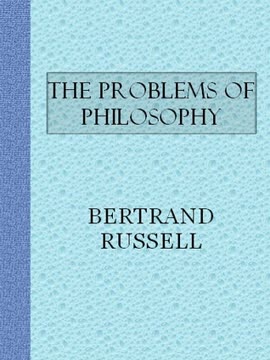Key Takeaways
1. Ancient philosophy engages with timeless human concerns
Medea's situation as calling for explanation and understanding in terms that they, and we so many years later, can readily recognize as philosophical.
Reason vs. Emotion: Ancient philosophers grappled with the conflict between reason and emotion, exemplified by Medea's dilemma. This tension remains relevant today, as we still struggle to understand our motivations and actions.
Competing Theories: The Stoics viewed the soul as a unity, arguing that emotions are a form of reason. Plato, in contrast, posited a divided soul with distinct rational and emotional parts. These differing perspectives highlight the complexity of human nature and the ongoing debate about the relationship between reason and emotion.
- Stoic view: Emotions are a type of reason
- Platonic view: Soul has separate rational and emotional parts
Philosophical Relevance: By examining these ancient debates, we gain insights into our own struggles with conflicting desires and motivations, demonstrating the enduring value of philosophical inquiry in understanding the human condition.
2. The Republic's interpretation evolves with changing contexts
It has certainly been one of his more suggestive ones.
Shifting Focus: The interpretation of Plato's Republic has changed dramatically over time, reflecting the evolving concerns and perspectives of different eras.
Historical Context: Initially seen as a work on ethics, the Republic gained prominence in the 19th century as a political text. This shift was influenced by contemporary debates about democracy and political reform. In the 20th century, interpretations became more critical, with some viewing it as totalitarian.
- Ancient view: Primarily an ethical work
- 19th century: Political blueprint for reform
- 20th century: Controversial political ideas
Interpretative Lessons: The changing reception of the Republic highlights the importance of considering our own assumptions and historical context when engaging with ancient texts. It also demonstrates the richness and complexity of philosophical works that can speak to different concerns across centuries.
3. Happiness in ancient ethics differs from modern conceptions
Happiness in ancient ethical thought is not a matter of feeling good or being pleased; it is not a feeling or emotion at all. It is your life as a whole which is said to be happy or not, and so discussions of happiness are discussions of the happy life.
Eudaimonia: Ancient Greek ethics focused on eudaimonia, often translated as "happiness" but more accurately understood as human flourishing or living well.
Virtue and Happiness: For many ancient philosophers, virtue was central to achieving happiness. This contrasts with modern hedonistic views that equate happiness with pleasure or desire satisfaction.
- Ancient view: Happiness as a life well-lived
- Modern view: Happiness often seen as pleasure or satisfaction
- Key debate: Is virtue sufficient for happiness?
Enduring Relevance: The ancient approach to ethics offers a compelling alternative to modern conceptions of happiness, encouraging us to consider the overall shape and quality of our lives rather than focusing solely on momentary pleasures or satisfactions.
4. Ancient epistemology focuses on wisdom and understanding
What is taken to matter for knowledge is whether you can, as an expert can, grasp the relevant items in a way that relates them to one another and to the field as a whole, and can give a reasoned account of this, one which explains the particular judgements you make and relates them to your unified grasp of the whole.
Expertise Model: Ancient epistemology emphasized understanding and wisdom rather than mere accumulation of facts. Knowledge was seen as akin to expertise, requiring a comprehensive grasp of a subject.
Philosophical Approaches: Different schools developed varied epistemological theories:
- Plato: Knowledge as understanding of Forms
- Aristotle: Knowledge as structured understanding within specific sciences
- Stoics: Emphasis on "apprehension" of empirical facts
- Sceptics: Suspension of judgment due to inability to achieve certainty
Relevance Today: The ancient focus on understanding and wisdom offers a valuable counterpoint to modern tendencies to equate knowledge with information. It encourages us to seek deeper comprehension and to recognize the interconnectedness of ideas within fields of study.
5. Logic develops as a tool for philosophical reasoning
Logic is one of the more impressive achievements of Aristotle. Finding no given systematic techniques for classifying and distinguishing arguments that just persuade people from arguments which lead to true conclusions by valid inferences (and also finding, as today, many influential people glorying in conflating the two), Aristotle systematized the notion of valid argument and constructed an extensive logical system.
Aristotelian Logic: Aristotle developed a system of syllogistic logic, focusing on the formal structure of arguments.
Stoic Contributions: The Stoics advanced propositional logic, examining the relationships between statements.
- Aristotle: Focus on terms and universal claims
- Stoics: Analysis of compound statements and inference rules
Philosophical Importance: The development of logic provided philosophers with tools for rigorous reasoning and argument analysis. This emphasis on logical structure continues to be a hallmark of philosophical thinking today.
6. Teleology shapes ancient views on nature and purpose
Aristotle's teleological approach is the source of his most sympathetic insights.
Competing Views: Ancient philosophers held diverse perspectives on the existence and nature of purpose in the natural world:
- Aristotle: Teleology without design, focusing on inherent natural purposes
- Plato and Stoics: Teleology with design, positing a divine creator or rational order
- Epicureans: Rejection of teleology, explaining nature through random atomic motions
Lasting Impact: These debates about purpose in nature have had a lasting influence on Western thought, shaping subsequent theological and scientific discussions about the origins and nature of the universe.
7. Philosophy emerges as a distinct discipline with Socrates and Plato
Plato has a claim to be the first philosopher to establish philosophy as a subject.
Socratic Method: Socrates emphasized the importance of questioning and reasoned argument in pursuit of understanding.
Plato's Contributions: Plato institutionalized philosophy through:
- Establishing the Academy
- Writing dialogues that exemplify philosophical reasoning
- Developing systematic philosophical views
Professionalization: The establishment of philosophical schools led to the development of philosophy as a distinct discipline with its own methods, terminology, and traditions of debate.
8. Ancient philosophical schools foster diverse intellectual traditions
From the first century BC we find that the continuing debates between the schools give rise to some schools which are hybrids, or 'eclectic' – combining positions from different schools to form a new stance.
Major Schools: Various philosophical traditions emerged, including:
- Platonism
- Aristotelianism
- Stoicism
- Epicureanism
- Scepticism
- Cynicism
Intellectual Exchange: These schools engaged in ongoing debates and cross-pollination of ideas, leading to the development of hybrid approaches and continual refinement of arguments.
Cultural Impact: The diversity of philosophical schools provided a rich intellectual landscape in the ancient world, influencing education, politics, and personal ethics throughout the Mediterranean region.
9. The end of ancient philosophy marks a cultural shift
Yet there is a rightness to the idea that it was intolerance by a Christian Emperor that marked the tradition's end.
Historical Context: The closing of pagan philosophical schools in Athens in 529 CE symbolizes the end of ancient philosophy as a living tradition.
Cultural Transformation: The rise of Christianity led to a shift in intellectual focus:
- Emphasis on faith and scripture over rational inquiry
- Selective incorporation of philosophical ideas into Christian theology
- Decline of open philosophical debate and diversity of schools
Legacy: While ancient philosophy as a continuous tradition ended, its ideas and methods continued to influence Western thought, periodically resurging in importance during subsequent historical periods such as the Renaissance and Enlightenment.
Last updated:
FAQ
What's "Ancient Philosophy: A Very Short Introduction" about?
- Overview: The book, written by Julia Annas, provides a concise introduction to ancient philosophy, exploring its themes and relevance to modern thought.
- Themes: Annas examines six key themes to engage readers with ancient philosophical ideas and their modern interpretations.
- Approach: The writing is lively and non-technical, making complex philosophical ideas accessible to a broad audience.
- Purpose: It aims to stimulate interest in ancient philosophy and highlight its ongoing influence on contemporary thinking.
Why should I read "Ancient Philosophy: A Very Short Introduction"?
- Engaging Style: Julia Annas is known for her engaging writing style, which makes complex philosophical ideas accessible and interesting.
- Foundational Knowledge: The book provides a foundational understanding of ancient philosophy, essential for anyone interested in the history of ideas.
- Modern Relevance: It connects ancient philosophical themes to modern issues, showing their continued relevance.
- Expert Insight: Annas is a renowned scholar, offering authoritative insights into ancient philosophical traditions.
What are the key takeaways of "Ancient Philosophy: A Very Short Introduction"?
- Philosophical Themes: The book explores six major themes in ancient philosophy, including ethics, knowledge, and metaphysics.
- Historical Context: It provides historical context for ancient philosophical ideas and their development over time.
- Modern Connections: Annas highlights how ancient philosophy influences modern thought and how it is interpreted today.
- Philosophical Engagement: The book encourages readers to engage with philosophical ideas critically and reflectively.
How does Julia Annas approach ancient philosophy in this book?
- Non-chronological: Annas does not follow a strict chronological order but focuses on themes to engage readers with philosophical ideas.
- Thematic Exploration: She explores six themes to highlight the interest and challenge of ancient philosophy.
- Modern Relevance: Annas connects ancient ideas to modern philosophical discussions, showing their ongoing influence.
- Accessible Writing: The book is written in a lively, non-technical style, making it accessible to a wide audience.
What are the six themes explored in "Ancient Philosophy: A Very Short Introduction"?
- Humans and Beasts: Understanding the conflict of reason and emotion within ourselves.
- Plato’s Republic: Examining why this work is still read and its impact on modern thought.
- The Happy Life: Comparing ancient and modern views on happiness and virtue.
- Reason and Knowledge: Exploring ancient skepticism and the nature of knowledge.
- Logic and Reality: Discussing metaphysical debates and the nature of reality.
- Philosophical Beginnings: Investigating the origins and nature of ancient philosophical traditions.
What is the significance of Plato's "Republic" according to Julia Annas?
- Central Work: "Republic" is often seen as a central work in Plato's thought, especially in modern interpretations.
- Political Theory: It is frequently read as a political text, though Annas suggests its ethical themes are equally important.
- Historical Reception: The book's interpretation has changed over time, reflecting different philosophical and cultural contexts.
- Philosophical Engagement: Annas encourages readers to question traditional interpretations and engage with the text critically.
How does Annas address the concept of happiness in ancient philosophy?
- Eudaimonism: Ancient philosophy often views happiness as living a life of virtue and fulfillment, not just pleasure.
- Virtue and Happiness: Annas explores how ancient thinkers like Aristotle and the Stoics connect virtue to happiness.
- Hedonism Critique: The book discusses the limitations of hedonism as a path to happiness in ancient thought.
- Modern Relevance: Annas relates these ancient ideas to contemporary discussions on happiness and well-being.
What role does skepticism play in ancient philosophy according to the book?
- Socratic Influence: Socrates is seen as a foundational figure in skepticism, questioning the certainty of knowledge.
- Pyrrhonism: The book explores Pyrrhonian skepticism, which emphasizes suspension of judgment and tranquility.
- Academic Skepticism: Annas discusses the skeptical tradition in Plato's Academy, which focused on questioning dogmatic beliefs.
- Philosophical Impact: Skepticism challenges the assumptions of knowledge and belief, influencing later philosophical developments.
How does Annas describe the relationship between logic and reality in ancient philosophy?
- Aristotelian Logic: Aristotle's development of logic as a tool for understanding reality is a key focus.
- Stoic Contributions: The Stoics' advancements in propositional logic are highlighted as significant.
- Metaphysical Debates: Annas discusses ancient debates on the nature of reality and the role of logic in understanding it.
- Philosophical Tools: Logic is presented as both a tool and a subject of philosophical inquiry in ancient thought.
What are the best quotes from "Ancient Philosophy: A Very Short Introduction" and what do they mean?
- "Philosophy begins with wonder": This quote from Aristotle emphasizes the natural human desire to understand the world.
- "The happy man needs the goods of the body and external goods": Aristotle's view that happiness requires both virtue and external goods.
- "The philosopher-king is Plato himself": A critique by Karl Popper, suggesting Plato's political ideas reflect his own philosophical ambitions.
- "The investigation of the truth is in one way hard, in another easy": Aristotle's acknowledgment of the challenges and rewards of philosophical inquiry.
How does Annas address the origins of ancient philosophy?
- Greek Beginnings: The book explores the emergence of philosophy in ancient Greece, starting with figures like Thales.
- Cultural Influences: Annas discusses the influence of Eastern cultures on early Greek philosophical thought.
- Philosophical Traditions: The development of distinct philosophical traditions and schools is a key focus.
- Historical Context: The book provides context for the social and cultural factors that shaped ancient philosophical ideas.
What is the role of philosophical schools in ancient philosophy according to Annas?
- Institutionalization: Annas describes how philosophical schools institutionalized philosophy as a subject of study.
- Diverse Traditions: The book highlights the diversity of philosophical schools, such as the Stoics, Epicureans, and Cynics.
- Intellectual Community: Schools provided a community for philosophical debate, teaching, and the development of ideas.
- Legacy: The influence of these schools on the transmission and evolution of philosophical thought is emphasized.
Review Summary
Ancient Philosophy: A Very Short Introduction receives mixed reviews. Many find it informative and engaging, praising its concise overview of major philosophers and ideas. Readers appreciate the author's balanced approach and accessibility. However, some criticize the book's density and occasional lack of detail. The middle sections are noted as slower-paced and more technical. While some view it as an excellent starting point for further study, others find it challenging for complete beginners. Overall, it's considered a solid introduction to ancient Greek philosophy, despite its limitations.
Very Short Introductions Series Series

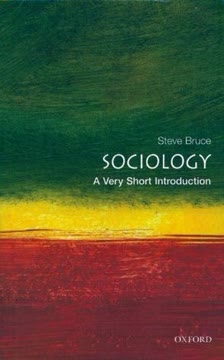

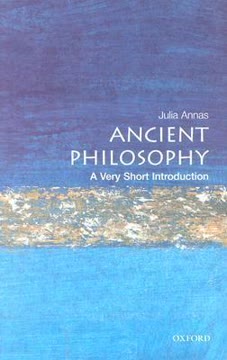





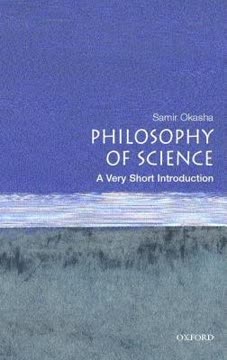
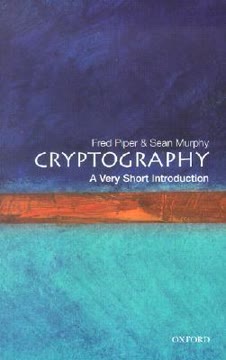
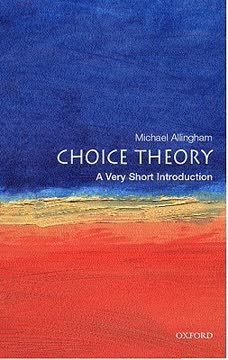
Similar Books
Download PDF
Download EPUB
.epub digital book format is ideal for reading ebooks on phones, tablets, and e-readers.



